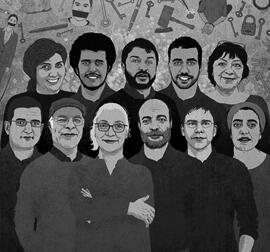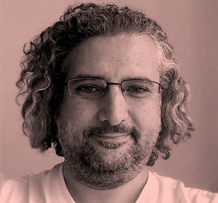10 human rights defenders from different non-governmental organizations gathered in İstanbul Büyükada for a training workshop and were detained in a police raid on the 5th day of the workshop, on July 5th, 2017. While 8 of 10 defenders were arrested, 2 of them were released on condition of judicial control. In the indictment announced three months later, it was seen that one more rights defender was added among the suspects. The verdict of the case held at the Istanbul 35th High Criminal Court, which led to reactions and campaigns at national and international levels, was held on July 3rd, 2020. While various prison sentences were given to four defenders, seven defenders were acquitted. All defendants were acquitted 6 years after their arrest.
With the decision and with the knowledge of the civil society organizations that form the Human Rights Joint Platform (İHOP), a training workshop was organized for civil society organizations in Büyükada, Istanbul between July 2–7, 2017. On the fourth day of the workshop (July 5th, 2017), under the instructions of the Adalar Chief Public Prosecutor's Office, police raided the workshop, and ten human rights defenders were taken into custody. While the rights defenders were not allowed to inform their families or lawyers about the detention, which was recorded in the detention report as taking place at 14:30, the public learned that they were detained by chance in the evening hours of July 5th.
Detained for two weeks
Detained İdil Eser (Director of Amnesty International Turkey), Özlem Dalkıran (Helsinki Citizens Assembly), Günal Kurşun (Human Rights Agenda Association), Veli Acu (Human Rights Agenda Association), Ali Garawi (Swedish human rights trainer) and Peter Steudtner (German human rights trainer) were arrested, while Nalan Erkem (Helsinki Citizens Assembly), Şeyhmus Özbekli (Rights Initiative) İlknur Üstün (Women’s Coalition) and Nejat Taştan (Association for Monitoring Equal Rights) were released on judicial control and a travel ban. The detention period, which was initially seven days, was extended to 14 days, and the rights defenders were brought to the prosecutor’s office only on July 17th, 2017, with a request for their arrest on charges of “acting on behalf of the organization without being a member” and “membership to an armed terrorist organization.”
Six rights defenders arrested
On July 18th, 2017, rights defenders İdil Eser, Özlem Dalkıran, Günal Kurşun, Veli Acu, and experts Ali Garawi and Peter Steudtner were taken to the prosecutor's office and arrested, while Nalan Erkem, Şeyhmus Özbekli, İlknur Üstün and Nejat Taştan were released with judicial control and a ban on leaving the country.
Two more rights defenders arrested
An arrest warrant against four people was issued on July 21st, 2017, following the prosecutor’s objection to the initial ruling on their release. Nalan Erkem and İlknur Üstün were taken into custody a second time, from their homes, and later arrested. Nejat Taştan and Şeyhmus Özbekli were released again, with an international travel ban and having to report to the police twice a week during a probation period.
Approximately three months later, on October 4th, 2017, an indictment was issued by the Istanbul Chief Public Prosecutor’s Office, charging all the rights defenders with “membership to an armed terrorist organization” (Article 314/2 of the Turkish Criminal Code) and “knowingly and willingly aiding a terrorist organization” (Article 220/6 of the Turkish Criminal Code), included The Chair of Amnesty International Turkey, Lawyer Taner Kılıç, who has been detained since June 9th, 2017 on charges of “membership to an armed terrorist organization”.
In the press release made before the first hearing of the case at Istanbul 35th High Criminal Court on October 25th, 2017, it was stated that “The training on coping with trauma and digital security has nothing confidential, has been organized in an open and transparent manner and basically aims to enhance the information and wellbeing of rights defenders. It is about a normal issue, organized everywhere in the world, yet the lawsuit aims to forcibly criminalize the training as well as its participants, “ pointing to the efforts to criminalize civil society activities. This case, in which members of different organizations were tried for their human rights activities, was the beginning of the targeting of civil society organizations as a result of the shrinking civil space in Turkey, together with the Gezi Trial.
In the press statement made before the first hearing of the case at Istanbul 35th High Criminal Court on 25 October 2017, it was stated that ‘This case also aims to forcibly criminalise a training meeting on dealing with digital security and trauma, which is held all over the world and has become commonplace, and which is organized openly and transparently, without secrets and secrecy, and which basically aims to increase the well-being and knowledge of rights defenders, and its participants,’ pointing to the efforts to criminalize civil society work.
Eight rights defenders released
In the first hearing, all rights defenders except Taner Kılıç were released after 113 days of detention. In addition, as a result of this hearing, Taner Kılıç's file at Izmir 16th High Criminal Court was merged with the Büyükada file.
Taner Kılıç first released and then arrested
Taner Kılıç was released on the 3rd trial held on January 31st, 2018 but was re-arrested on February 1st, 2018, upon the prosecutor's objection. On the 4th trial held on June 21st, 2018, it was decided to continue detention of Kılıç.
Taner Kılıç was released on August 15th, 2018, after more than 14 months in detention, following an appeal against his detention.
Prosecutor announced his final opinion
At the hearing of Büyükada Trial held on October 9th, 2019, the prosecutor's request for time to prepare his final statement was accepted. At the hearing held on November 27th, 2019, the prosecutor gave his final opinion.
He demanded that Taner Kılıç be punished for the charge of “Membership to an armed terrorist organization” and Günal Kurşun, İdil Eser, Özlem Dalkıran, Nejat Taştan and Veli Acu be punished for the charge of “knowingly and willingly aiding a terrorist organization. “
The prosecutor demanded the acquittal of Peter Frank Steudtner, Ali Gharavi, İlknur Üstün, Nalan Erkem and Muhammed Şeyhmus Özbekli on the grounds that ‘no convincing evidence was obtained that they committed the crime of “knowingly and willingly aiding a terrorist organization”.
At the 11th hearing on February 19th, 2020, the defendants’ arguments on the merits were heard. The defense was scheduled to be heard on April 3rd, 2020, but the hearing was postponed to July 3rd, 2020, due to the COVID-19 pandemic.
Letter from the UN on the Büyükada Case
Prior to the verdict hearing, the UN Special Rapporteur sent a letter to the government of Turkey on June 30th, 2020. In the letter; concern was expressed over the trial of 11 rights defenders for terrorism-related crimes. Rapporteur emphasized the negative impact of the case on civil society in Turkey.
On July 3rd,2020, Istanbul 35th Assize Court sentenced Amnesty International Turkey’s Honorary Chair Taner Kılıç to six years and three months in prison over “membership to an armed terrorist organization” and rights defenders Günal Kuşun, İdil Eser and Özlem Dalkıran were handed two years and 1 month jail terms each over “knowingly and willingly aiding a terrorist organization.” Nalan Erkem, lknur Üstün, Ali Gharavi, Peter Steudtner, Veli Acu, Nejat Taştan and Şeyhmus Özbekli were acquitted. In the Turkish government’s, response to the UN special rapporteur on 24 July 24th, 2020, it was emphasized that everyone is equal before the law and the courts in Turkey. It was stated that the rights of everybody are guaranteed by the state without discrimination. However, it was stated that this guarantee does not recognize immunity before the law. It was argued that the interpretation of human rights violations made before the convictions go to the high judiciary is premature and biased.
Court of Appeals rejects appeal request
The 3rd Criminal Chamber of the Istanbul Regional Court of Appeals rejected the appeal of Taner Kılıç, Günal Kurşun, İdil Eser and Özlem Dalkıran on November 26th, 2020, with the way of appeal open.
The Court of Cassation overturned the verdict
The 3rd Chamber of the Court of Cassation overturned the local court's decision on October 17th, 2022. According to the decision, Taner Kılıç, Honorary Chair of Amnesty International, was sentenced to prison as a result of incomplete research. Former Amnesty International Turkey director İdil Eser, Human Rights Agenda Association Board member Günal Kurşun and rights defender Özlem Dalkıran had to be acquitted.
The file was sent to the Istanbul 35th High Criminal Court for a retrial.
At the first hearing on March 8th, 2023, the court board announced its interim decision after announcing that it complied with the annulment decision. The delegation decided to continue the foreign travel ban on Kılıç and to investigate whether he used ByLock. As soon as the expert report on this issue came, it was decided to send the file to the opinion. The next hearing was scheduled for June 6th, 2023.
Acquittal in retrial
The next hearing was held on June 6th, 2023. The prosecutor stated that there was no evidence against Günal Kurşun, İdil Eser and Özlem Dalkıran after the reversal of the Court of Cassation and asked for their acquittal as there was no evidence in the file that Günal Kurşun aided the Fethullahist organization.
The prosecutor claimed that Taner Kılıç had accessed ByLock IPs according to HTS and CGNAT records and demanded his sentence on the charge of ‘membership to an armed terrorist organization’.
The court acquitted the four defendants on the grounds that it was not established that they committed the offence charged. Kılıç's ban on leaving the country was lifted with the verdict; however, the prosecutor's office objected to the verdict for Taner Kılıç.
Acquittals finalized
The 3rd Criminal Chamber of the Court of Cassation rejected the prosecution's appeal and upheld the acquittal of Taner Kılıç. Thus, the eight-year-long trial process finally came to an end and all defendants in the Büyükada case were acquitted of the charges.



